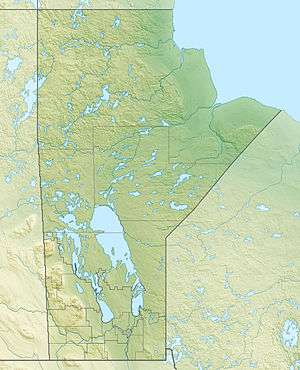Duck Bay, Manitoba
Duck Bay is a community located in the Canadian province of Manitoba, along the western shores of Lake Winnipegosis.

The primary industry of the community is fishing, trapping and some agriculture. The Duck Bay wharf provides berthing for 15–20 skiffs and 3–5 whitefish vessels.[1]
The inhabitants of the community once called Baie de Canard (French for Duck Bay) [1] are mostly Métis of Ojibway and French ancestry. Duck Bay is still called Zhiishiibi-Zhiibiing (Duck River) by the Metis and Saulteaux. The present town of Duck Bay is located on a peninsula on the northwest shore of Lake Pittowinipik (Winnipegosis). For centuries this location was a fall gathering place for Aboriginal people. The neighbouring marshes provided for spring and fall migratory bird hunts and there was also a large fall fishery. The salt springs of the area were also a developed economic asset. In the 1800s Duck Bay became a wintering area for Metis hunters, fishers and traders. In 1839, Father Belcourt made his first visit to the community. Duck Bay House (1859-1887) at the south end of the bay was established by the Hudson's Bay Company. [2]
History
Duck Bay was established at the turn of the century as a Hudson's Bay Company trading post, and is named after the bay on which it is situated. A gravel road to Camperville, Manitoba was completed in 1952.[1]
A mystery surrounds the death of Father Darveau O.M.I.. His body was found on the shore near the village of Duck Bay and a monument marks the site. He either drowned accidentally or was murdered.[3] The monument reads "Here was found the body of Rev. Fr. J. E. Darveau Missionary, born 1816 Massacred June 4, 1844".[3] Another larger monument on the grounds of the Roman Catholic mission in Camperville reads "In memory of the Rev. J. E. Darveau, missionary. Born in Quebec, 17 March 1816. Massacred 22 miles north 4 June 1844".[3]
Demographics
In the 2011 Census, the Duck Bay designated place had a population of 408 living in 123 of its 129 total private dwellings.[4]
References
- "Duck Bay official website". Retrieved 2013-03-28.
- Barkwell, Lawrence J. (2018) Historic Metis settlements in Manitoba and geographical place names. Winnipeg, Manitoba: Louis Riel Institute, 2018. ISBN 978-1-927531-1-81.
- "MHS (Camperville and Duck Bay)". Retrieved 2013-03-28.
- "Corrections and updates: Population and dwelling count amendments, 2011 Census". Statistics Canada. February 14, 2013. Retrieved February 16, 2013.
External links